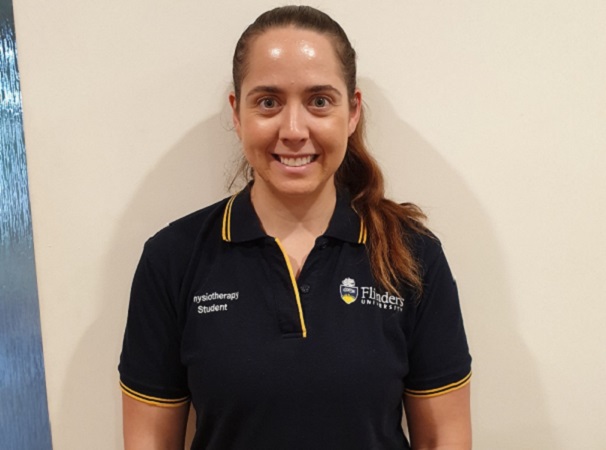
The COVID-19 crisis has given Flinders physiotherapy student Elyse Bell a fast lesson on the importance of adapting to change during her placement with the Multiple Sclerosis (MS) Society.
While face-to-face assessments are usual practice for physiotherapists, the onset of the pandemic meant adapting practice to telehealth services.
“The most interesting facet to this placement was the huge flip in my learning from face-to-face to telehealth,” says Elyse, who is in her final year of the Master of Physiotherapy degree.
“Adapting the physical assessment to the new platform was just another part of the challenge. My supervisor Margot Strelan and I started brainstorming how we could continue these tasks without the clients having to come into the office where they would be at increased risk.
“To address this problem, we learnt how to use Zoom for video sessions and PhysiTrack software to set up clients with home exercise programs.
“We developed how-to and troubleshooting guides, virtual physio and exercise tips and a pre-screening questionnaire for one-on-one appointments.”
Elyse and her supervisor, also ran the MS Falls Prevention Sessions online, helping multiple sclerosis clients to reduce fatigue, improve mobility and reduce the frequency and possibility of falling over.

The online class was based on a research project led by Emeritus Professor Sheila Lennon in collaboration with Flinders Master of Physiotherapy alumni.
“Another great thing about completing appointments via Zoom was that we could see the client’s home environment and they often behaved differently in the comfort of their own home,” she says.
“This was great when correcting the exercises they were doing, seeing what equipment they were using and observing the environment for safety.”
Elyse said the unexpected changes in her placement taught her much about being adaptable to change.
“I feel really lucky that I was in a position to help establish and implement telehealth strategies for the MS Society. This placement was like no other due to the diversity in the skills I have acquired both physio-related and other,” she says.
“I believe that this diverse skill set will help me to gain employment at the end of this degree and perhaps even direct me on to a career path that I never expected.”
Elyse is driven by an ambition to “help people all over the world, not just those who can afford healthcare”.
With Flinders being one of few universities to deliver a Master of Physiotherapy program, the Bedford Park campus was the obvious choice for Elyse.
She says the degree is challenging but students are supported during the entire experience.
“There are so many services on offer to help students through their degrees and the physiotherapy teaching staff have been wonderful. They are so invested in our success and that is a lovely feeling,” Elyse says.
“I have learnt so much in such a short space of time. It’s opened my eyes to the possibilities ahead of me and the diversity of skills I’ve gained has helped me to prepare for the many possible career directions.”
For more information on studying Physiotherapy, visit the website.

